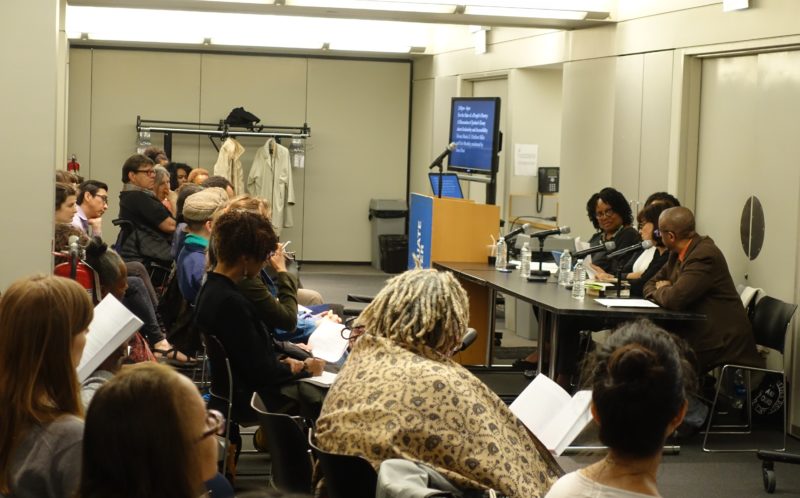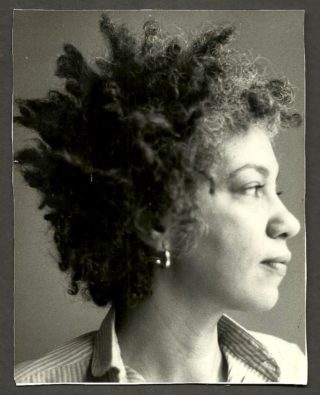E. Ethelbert Miller shares his presentation from the panel "For the Sake of People’s Poetry: A Discussion of Jordan’s Essay about Inclusivity and Accessibility," part of the conference A Tribute to June Jordan. The panel was framed and moderated by Erica Hunt and also included presentations by Donna Masini and Evie Shockley.
--
On February 2, 1980, June Jordan sent me the following note:
Dearest Ethelbert,
Thank you so much for the Walt Whitman foto. I’ve matted it and placed it, hanging up on my bedroom wall. It’s really a fine portrait of the hairy old man!
That June Jordan would mat and frame a picture of Walt Whitman underscores his importance to her life and work. It should not be overlooked that she hung the picture on her bedroom wall. She did not place Whitman in the living room. She placed him on her bedroom wall. The bedroom a place of intimacy, a place of love, a place where one finds June Jordan doing things one does in the dark. When her book Things That I Do In The Dark was published in 1977 the cover design completely misunderstood what Jordan wanted to convey to her readers and audience. Whereas Random House presented a hand on a naked shoulder, Jordan was thinking about how she would rise in the middle of the night perhaps groping for something to write with. How often are poems born out of dreams?
These poems
they are things that I do
in the dark
reaching for you
whoever you are
and
are you ready?
These words
they are stones in the water
running away
These skeletal lines
they are desperate arms for my longing and love.
I am a stranger
learning to worship the strangers
around me
Whoever you are
whoever I may become. [1]
Where we find Jordan reaching out to strangers we now live in a world where a US government has a desire to build walls. Americans are afraid of the stranger – the other. The person of color, the person who might not speak English, the person who worships God in a different way.
Jordan in her 1980 note calls Whitman a hairy old man. Words of endearment that could also be misinterpreted as those of caution. In her essay “For the Sake of People’s Poetry Walt Whitman and the Rest of Us,” written in 1981, we find Jordan being curious of this white man. She sees his whiteness before she sees or hears his poetry. Always the poet asking questions, Jordan wants to know more about this man. What rumor should the rest of us put to rest?
At the beginning of her essay June Jordan questions her early education. She is fortunate that within her home she at least learned about Dunbar. In the early sixties when I was growing up in the South Bronx, living in the St. Mary’s Housing Apartments, a few blocks from Junior High School 120, also known as Paul Laurence Dunbar. I attended this school and graduated never knowing who Dunbar was. A bust of his head was outside the building, but the body of his work was never shared or taught to black kids who looked like me.
Jordan’s essay should be seen as a wakeup call to our memory; a reminder of the archaeological challenges we still confront as writers – the digging we must do before we are dug. But let us note that Jordan’s essay was written 37 years ago.*
This is before the birth of Cave Canem in 1996 or Canto Mundo in 2009. Today these organizations serve as literary sentinels protecting the American imagination. They guarantee that our future society and our literature will no longer be defined by whiteness or by the few. We demand democratic anthologies as well as a democratic state.
It is important to note that in her essay Jordan provides us with a definition of New World. As writers we understand the importance of language and the need to define and provide clarity. It is perhaps just a coincidence that in 1981, the literary critic and editor Hoyt Fuller died at the age of 57. Fuller who had been the editor of Negro Digest and Black World had founded the journal First World.
The title was a rejection of being viewed as part of a European-defined Third World. A movement from Black World to First World. The writer John Killens often spoke about the need to be viewed as First World people and not Third World people of developing countries in Asia, Africa and Latin America. A Cold War term that also represented nations that were non-aligned from the Western or Communist bloc. Of course, Fuller and Killen’s definition is an attempt to redefine what it means to be ‘first’--First World first being used to represent the industrialized capitalist countries of Western Europe, North America, Japan, Australia and New Zealand.
How June Jordan defines New World is therefore critical, prior to our acceptance and adoption of the term. At times our future language must shed its past.
We notice first Jordan’s wit and humor prior to defining what New World means.
“New World does not mean New England,” she writes. This single statement rejects the American Revolution as the beginning of America. It’s a quiet way of acknowledging that Native Americans were here before the bearded people arrived. Jordan goes on in what she describes is a brief definition;
New World means non-European; it means new; it means big; it means heterogenous; it means unknown; it means free; it means an end to feudalism, caste, privilege, and the violence of power. It means “wild” in the sense that a tree growing away from the earth enacts a wild event.
Often when using a dictionary to look up the definition of a word we stop after discovering the term’s first meaning. In this case, one would simply conclude Jordan’s use of the term New World means non-European.
What I find attractive within Jordan’s full definition is the equating of New World with the unknown. One can link this to Richard Wright’s encouragement to African American writers to pursue that aspect of the black experience which embraces the forms of things unknown. This is the title Stephen Henderson gives to the introduction of his important anthology “Understanding the New Black Poetry” published in 1973. It is the unknown which at times speaks to the scientist and explorer. It is the unknown the writer embraces when he or she realizes the need to provide evidence for things unseen.
Here is where we might find the New World writer speaking as witness, reminding us what it means to be free, demanding an end to privilege and the violence of power.
Finally, Jordan’s use of the term to mean wild in the sense of a tree growing should remind us of something the Nicaraguan poet Ernesto Cardinal wrote about at the end of his poem “Ecology.”
We will restore our forests, rivers, lagoons.
We will decontaminate Lake Managua.
Not only humans longed for liberation.
All ecology groaned for it also. The revolution
is also one of lakes, rivers, trees and animals.
One links Jordan to Cardinal if only for the fact that the essay “For the Sake of People’s Poetry” is the first essay in her collection On Call: Political Essays. On the cover of this book one finds a picture of June Jordan (with Francisco Campbell) in Nicaragua. In this book one also find Jordan’s note right after the copyright page. It reads:
Given that they were first to exist on the planet and currently make up the majority, the author will refer to that part of the population usually termed Third World as the First World.
To be a New World poet requires an openness in understanding how the world must be refigured. June Jordan was perhaps as much a futurist as Buckminster Fuller. It is Jordan who once wrote “Like a lot of Black women, I have always had to invent the power my freedom requires.”
How do we learn to equate invention, power and freedom? Being a New World poet means we must solve the equations and find the solutions that link the material to the spiritual. How do we speak a common language? What is the future of democracy if we live in a Republic? Or as Harold Bloom once said – they have the numbers but we have the height.
In her essay, Jordan mentions the names of the writers whose footsteps New World poets will follow. One is Agostinho Neto of Angola. In her poem “I Must Become a Menace to My Enemies” dedicated to Neto who at that time in 1976 was the President of the People’s Republic of Angola, Jordan writes from a position of resistance:
How many of my brothers and my sisters
will they kill
before I teach myself
retaliation?
Jordan ends her poem with a reference to love. A word New World poets must place first in their vocabulary and second on their tongues and third in the ears of others. Jordan writes:
And if I
if I
ever let love go
because the hatred and the whisperings
become a phantom dictate I o-
bey in lieu of impulse and realities
(the blossoming flamingos of my
wild mimosa trees)
then let love freeze me
out.
I must become
I must become a menace to my enemies.
In his new book Neruda: The Poet’s Calling, Mark Eisner mentions how Pablo Neruda in one of his homes kept a picture of Walt Whitman on his desk. When I read this I thought about June. I thought of my own space. What writers have I surrounded myself with?
Here are their names: Reetika Vazirani, Zoe Anglesey, Dennis Brutus, Naomi Ayala. Charles Johnson, August Wilson, James Baldwin, Frank O’Hara and Langston Hughes and Liam Rector.
This pictorial tribe is my literary family. Only two are still living. These are the people whose faces I face every day. All their lives were not filled with beauty – but then neither is history.
The people I named have given me provisions of work that fill me and are delicious.
It’s a reminder that one must read, write and grow strong. There is much construction to be done in the New World. Our blueprints must be answers in waiting.
Yes – June,
teach me how to t.c.b./ to make do
and be
like
you
teach me to survive my
momma
teach me how to hold a new life
momma
help me
turn the face of history
to your face. [2]
-E. Ethelbert Miller / CUNY, May 18th
* The essay “For the Sake of People’s Poetry Walt Whitman and the Rest of Us “ can also be found in Jordan’s book Passion: New Poems 1977-1980.
In this book the essay is listed as being written in 1979.
[1] June Jordan, “These Poems” (1977)
[2] June Jordan, “Getting Down to Get Over” (1972)

